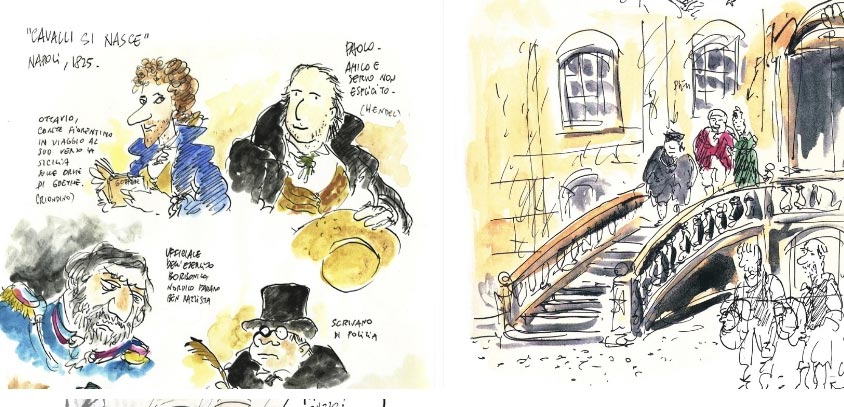
- This event has passed.
Archivi Mario Franco – Cavalli si nasce, un film di Sergio Staino
30 January 2019

January 30th 2019
STARTING PROJECTION at 6:00 p.m.
Archivi Mario Franco c/o Casa Morra Archivio d’Arte Contemporanea
Salita San Raffaele 20/C, Napoli
There will be present Eugenio Bennato and Pietra Montecorvino
We at the Archivi Mario Franco are delighted to host a screening of the film Cavalli si nasce, at 6pm on Wednesday 30th January, 2019. Directed by Italian cartoonist and director Sergio Staino, the film boasts a cast including Vincent Gardenia, David Riondino, Paolo Hendel, Delia Boccardo, Franco Angrisano, Beniamino Placido, Pietra Montecorvino, Paco Reconti, and Roberto Murolo.
Cavalli si nasce addresses the eternal contradiction between the scientific and rationalist world view and an irrational but “strongly altruistic and passionate” understanding, as the director himself puts it. The film grew out of an idea of Staino’s when, at the age of twenty-five, he was part of a social/town planning team looking at the territorial problems of the Cilento area, and focuses on how human beings can be overcome by their emotions and feelings. The “beauty of the locations, the charm of the ancient sheep tracks, the tiny Romanesque churches, and the fascinating Baroque complexes” (Sergio Staino) lead us to “move from one feeling of solidarity to another without attempting to pigeonhole the events in which we are involved into any precise scheme or to interpret them with a cold sense of detachment” (Sergio Staino).
The dichotomy between reason and instinct is represented by the film’s two protagonists: Ottavio, the cultured Florentine prince educated in the enlightened Habsburg-Lorraine school and enchanted with Goethe’s Journey to Italy, played by David Riondino, and his young servant and friend, Paolo, played by Paolo Hendel. The two travel round the south of Italy, following in the footsteps of the great German writer, and fall into a series of adventures and scrapes that engender a sense of indignation and rebellion, especially in Paolo. The story is set in 1832, the year of Goethe’s death and at the time when the Age of Enlightenment was transitioning into Romanticism.
The film, which won the 1989 Nastro d’Argento for best soundtrack, has an original score composed by Eugenio Bennato and Carlo d’Angiò. The music accompanies the viewer through the story: the “algebraic constructions” of Eugenio Bennato, deliberately interrupted and disrupted by the cracked and emotional voice of Charles of Anjou, set the rhythm of the entire film. “I had the music in my head even before working out the story in a complete script.” “The task of the music, in my opinion, was to bring out this dichotomy (the rational/irrational), in a commixture that would juxtapose the song of the farm workers and the refined music of the aristocratic salons; the desperate vocal timbre of Arab songs and atmospheres full of disturbing romantic sensuality”.
